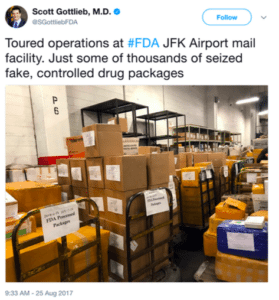Counterfeit Medicines And Fentanyl Pills in Top Ten of Seized Items by CBP

Source: FDA Commissioner’s Twitter account
A recent article in USA Today listed pharmaceuticals and personal care products as the seventh most frequently seized type of shipments by Customs and Border Protection (CBP). In fiscal year 2017, CBP processed over 278 million cargo and postal shipments only to seize and destroy 34,143 shipments containing counterfeit items. That number reflects the small number of counterfeit shipments that were stopped, with experts believing many more got through. While testifying in front of the House Energy and Commerce Health Subcommittee in March, U.S. Food and Drug Commissioner Dr. Scott Gottlieb said, “It is estimated that less than one-tenth of one percent of packages that contain drugs actually undergoes a physical inspection.”
According to the article, pharmaceuticals are one of the most counterfeited items and pose much more harm to the American consumer than knockoff luxury goods and electronics. Fake medicine frequently contains incorrect dosages or no active ingredient at all. CPB seized a total of 2,209 packages of fake pharmaceuticals and personal care products in fiscal year 2017 with a value of almost $70 million. This puts the average value of each shipment at over $31,500.
However, being part of massive shipments is not the only way that counterfeit medicines get into this country. Some drugs come across our northern and southern borders, and smaller shipments can easily sneak in via the U.S. Postal Service. In March 2018, Gottlieb told members of the subcommittee that, “Based on some estimates that were derived from an analysis we did in 2004, we estimate that about 9% of all packages contain some form of drugs: prescription drugs, counterfeit drugs, or controlled substances. And to your point, we estimate that we’re physically inspecting about less than 0.05 percent of them.”
Smaller shipments containing fentanyl are a significant concern. NBC News reported on a new warning by the Centers for Disease Control and Prevention (CDC) about the threat that fentanyl poses. The CDC’s alert stated that: “The dramatic rise in the supply of illicitly manufactured fentanyl and fentanyl analogs has been mirrored by an equally dramatic rise in deaths involving synthetic opioids other than methadone, a category which includes fentanyl and fentanyl analogs.” Additionally, the CDC cautioned that “Orally ingested counterfeit pills laced with fentanyl or fentanyl analogs may require prolonged dosing of naloxone in the ED hospital setting due to a delayed toxicity that has been reported in some cases.”